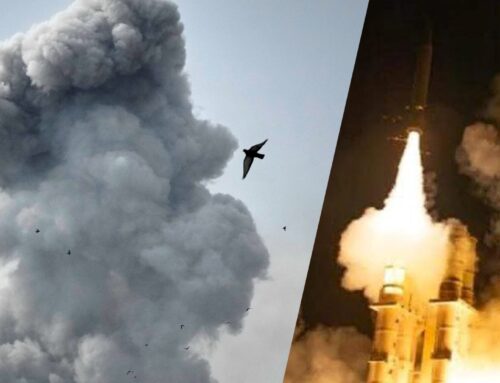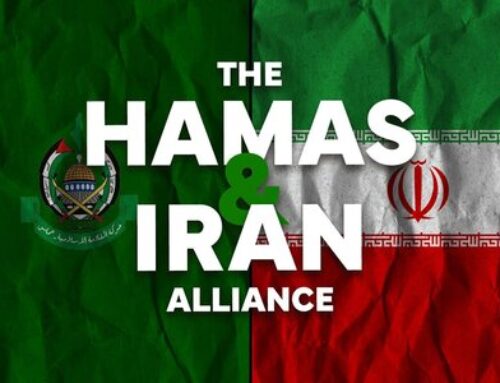U.S. Intelligence, Experts Cast Doubt on Claims of Israeli Strike on Hospital
The hospital blast in Gaza was the result of Islamic militants, not Israel
Wednesday, October 18th, 2023
By Margherita Stancati, Yaroslav Trofimov, Nancy A. Youssef, & Stephen Kalin
Reprinted from The Wall Street Journal
Israel, the U.S. government and independent security experts cast doubt Wednesday on Palestinian claims that an Israeli airstrike was responsible for a deadly explosion at a Gaza hospital compound, saying the preliminary evidence pointed to a local militant group.
Independent analysts poring over publicly available images of Tuesday’s explosion at Al-Ahli Arab Hospital in Gaza and its aftermath say the blast site doesn’t bear the hallmarks of a strike with a bomb or missile of the types usually used by Israel.
The amount of damage also appears inconsistent with the Hamas-controlled Gaza Health Ministry’s assertion that 471 people were killed.
“We have none of the indicators of an airstrike—none,” said Michael Knights of the Washington Institute for Near East Policy, an expert on military and security issues.
The U.S. has collected “high confidence” signals intelligence indicating that the blast at the hospital in Gaza was caused by the militant group Palestinian Islamic Jihad, U.S. officials said, buttressing Israel’s contention that it wasn’t responsible for the blast.
The U.S. assessment that Israel wasn’t behind the blast at the hospital drew, in part, on communications intercepts and other intelligence gathered by the U.S., defense officials said.
“Our current assessment, based on analysis of overhead imagery, intercepts and open source information, is that Israel is not responsible for the explosion at the hospital in Gaza,” White House National Security Council spokeswoman Adrienne Watson said, adding that the U.S. continues to collect information on the incident.
Photos and videos taken at the site of the blast show that the hospital compound’s buildings haven’t sustained major damage. The blast caused a very shallow crater in the parking lot outside. The small size of the open area where the explosion occurred, coupled with limited shock-wave damage, was inconsistent with the death toll claimed by the Palestinian Health Ministry, several open-source intelligence analysts said.
“At the moment, the preponderance of evidence does point to it being a Hamas or PIJ rocket hitting the area,” said Blake Spendley, an open-source intelligence analyst at the Center for Naval Analyses, a think tank in Virginia. He said videos and photos he has reviewed showing the scene were more consistent with a death toll of about 50 rather than the 500 initially claimed by Hamas.
Palestinian claims that Israel was responsible late Tuesday were echoed by several Middle Eastern governments, sparking angry street protests across the region and complicating a visit to Israel by President Biden. Those claims also drained whatever sympathy Israel might have had in the region from Hamas’s Oct. 7 attack on Israel, which caused the single biggest loss of Jewish lives since the Holocaust.
Biden, during his visit, said Israel’s version of events appeared more accurate based on information he had received from the Defense Department.
“Based on what I’ve seen, it appears as though it was done by the other team,” he said. “But there’s a lot of people out there not sure, so we’ve got a lot—we’ve got to overcome a lot of things.”
Israel on Wednesday offered what it said was proof that it wasn’t responsible for the incident, which it said was caused instead by an errant rocket fired from within Gaza by Palestinian Islamic Jihad. The group rejected the accusation.
Rear Adm. Daniel Hagari, Israel’s chief military spokesman, told a news conference that there had been no Israeli strike in the hospital area. Hagari shared what he said was an intercepted conversation between two unidentified Hamas operatives saying the rocket was fired by militants from a cemetery near the hospital.
Hagari said the blast took place in the parking lot of the hospital and that the hospital building itself didn’t suffer structural damage. He shared a photo of the burned-out parking lot, saying there was no deep crater at the site of the blast, an indication there hadn’t been an aerial strike. Hagari said the rocket’s residual propellant—fuel that boosts the rocket toward its destination—explains why the explosion was so powerful.
“Islamic Jihad caused the casualties in the hospital,” said Hagari. “We want the maximum transparency because we take any incident involving civilians very, very seriously.”
Spendley said that kind of damage appeared more consistent with a fireball from a rocket rather than the kinds of weapons that Israel’s air force uses, such as Joint Direct Action Munition, or JDAM, guided bombs.
“Something like a short-range rocket will cause more fire,” he explained. “With something like a JDAM you will get a lot of blast energy, and not as much energy wasted in heat or fire or light. There were some characteristics with the Palestinians killed in the strike that have led me to believe that there was a lot more fire that came from the impact than just pure blast energy.”
Other analysts agreed. Knights said the scene showed it “very clearly was hit by a rolling fireball.” The most plausible cause for that, Knights said, is rocket fuel, consistent with the Israeli military’s explanation that a rocket misfired.
Nathan Ruser, an analyst at the Australian Strategic Policy Institute, said on X, formerly known as Twitter, that the scene shown in photos was “not consistent with an airstrike and are not consistent with claims that 500+ people were killed.”
The published images also show a lack of shrapnel patterns associated with Israeli air force bombs, said Justin Bronk, an analyst at the Royal United Services Institute, a think tank in London.
“Still not conclusive, but IF this is the extent of the damage then I’d say an airstrike looks less likely than a rocket failure causing an explosion and fuel fire,” Bronk wrote on X.
A definitive conclusion, Spendley said, would require postmortem analysis of victims and other forensic field work that is unlikely to occur given Gaza’s current conditions.
Islamic Jihad accused Israel of wanting to “evade its responsibility for the brutal massacre it committed.” The militant group called the Israeli accusations that it was responsible “false and baseless.”
Shortly after the explosion, Palestinian Ambassador to the United Nations Riyad Mansour rejected Israeli claims that it wasn’t responsible. “Now they change the story to try to blame the Palestinians. It is a lie,” he said during a press conference at U.N. headquarters on Tuesday.
Hamas also blamed the blast on Israel, calling it a “crime of genocide,” and attacked the U.S. and Western countries for supporting Israel.
Hours after Biden’s visit, Israel said it had agreed to a request from the U.S. president to allow humanitarian aid into the Gaza Strip through Egypt. The Israeli prime minister’s office said Israel wouldn’t allow any aid into Gaza from within its own borders, however, until all the hostages taken by Hamas on Oct 7. are returned.
The Rafah border crossing with Egypt—the only official land crossing in Gaza that Israel doesn’t control—has been closed since the start of the war.
The explosion at the hospital complicated an already difficult situation in the region.
On Wednesday, protesters gathered in Iran, Jordan, Kuwait, Egypt, Tunisia and in the West Bank, where they clashed with security forces from the Palestinian Authority. In Lebanon and Iraq, protesters tried to break through security barriers leading to the U.S. and French embassies, chanting “death to America” and “death to Israel.”
Four hospital staff members were injured in the blast, said Suhaila Tarazi, the Palestinian-American director of the hospital, which was founded in the 1880s and funded largely by the European Union and the Episcopal Church. When she visited the hospital Wednesday morning, Tarazi said, windows were shattered and body parts were still scattered around.
Israel has warned hospitals in northern Gaza to evacuate in recent days. But hospitals have ignored the calls, saying that there aren’t enough beds at hospitals in the south to accommodate patients and that many patients can’t be transported on roads that are damaged or blocked with debris from the attacks. Some northern Gaza residents who ignored Israeli warnings to move south have taken shelter in hospitals, believing they would be safe there from attacks.
The Episcopal Church in Jerusalem and the Middle East, which runs the Al-Ahli Arab Hospital, initially put out a statement on Tuesday saying it had been struck “during Israeli airstrikes.”
On Wednesday, Hosam Naoum, the Anglican Archbishop in Jerusalem, declined to assign blame during a news conference. Naoum said the hospital’s parking lot, and not the hospital building itself, was directly hit.
Naoum declined to discuss a death toll, but said up to 5,000 people had taken refuge in the hospital compound at various points in recent days.
“We know the casualties were many,” said the archbishop, without elaborating. He called on Biden to push for justice and peace.
The deaths at the hospital prompted Jordan to cancel a meeting in Amman with Biden and the Egyptian, Jordanian and Palestinian leaders to discuss the situation in Gaza, Jordan’s Foreign Minister said Wednesday. Palestinian Authority President Mahmoud Abbas left Jordan and returned to the West Bank, senior Arab officials said.
Since the Oct. 7 attacks by Hamas, Israel has been carrying out a relentless air-bombing campaign on Gaza aimed at Hamas militants and their operational infrastructure. Israel is preparing for a major ground offensive in Gaza, although it hasn’t committed to it yet.
The war is already shaping up as one of the deadliest rounds of violence between Israelis and Palestinians. Some 1,400 Israelis were killed in the Hamas attack, and at least 200 hostages were taken to Gaza. Before the hospital blast, 3,000 people had been killed in Gaza, according to the Hamas-run Health Ministry. The death toll couldn’t be independently verified.
Around one million people are displaced within Gaza, the U.N. said Wednesday, roughly half of the enclave’s population.







Leave A Comment
You must be logged in to post a comment.